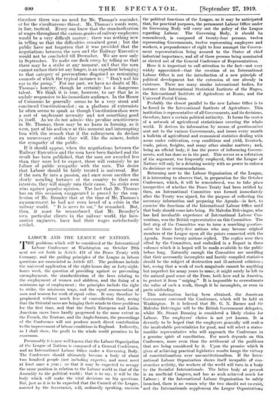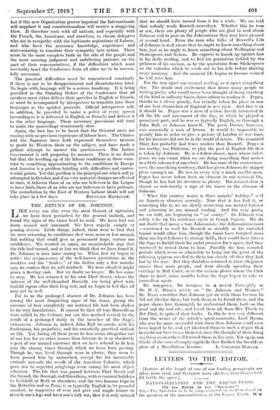LABOUR AND THE LEAGUE OF NATIONS.
rrIIIE problems which will be considered at the International J. Labour Conference at Washington on October 29th next are set forth in Article 424 of the Peace Treaty with Germany, and the guiding principles of the League in labour questions are enunciated in Article 427. The problems include the universal application of the eight-hours day or forty-eight- hours week, the question of providing against or preventing unemployment•, the standardization of the laws relating to the employment of women and children, and the fixing of a minimum age of employment ; the principles include the right to strike, the minimum wage, and the equal remuneration of men and women for work of equal value. It may therefore be prophesied without much fear of contradiction that, seeing that the Oriental races are bringing their minds to these problems for the first time, and that the South European and Latin- American races have hardly progressed to the same extent as the French, the Teutons, and the Anglo-Saxons, the proceedings of the Conference will not produce much direct contribution to the improvement of labour conditions in England. Indirectly, as I shall show, the profit to the whole world promises to be enormous.
Presumably it is now well known that the Labour Organization of the League of Nations is composed of a General Conference, and an International Labour Office under a Governing Body. The Conference should ultimately become a body of about two hundred people (not including experts), and must meet at least once a year ; so that it may be expected to occupy the same position in relation to the Labour world as that of the Assembly to the political world ; that is to say, it will be the body which will make the vital decisions on big questions. But, just as it is to be expected that the Council of the League, assisted by the Secretariat, will, ordinarily speaking, exercise the political functions of the League, so it may be anticipated that, for practical purposes, the permanent Labour Office under its Governing Body will carry out the policy of the League regarding Labour. The Governing Body, it should be remembered, is composed of twenty-four persons, twelve representing Governments, twelve representing employers and workers, a preponderance of eight to four amongst the Govern- ment representatives being assured to the States of chief industrial importance, and all of these persons being nominated or elected out of the General Conference of Representatives.
Here it is important to call attention to the fact—not very widely appreciated—that the creation of an International Labour Office is not the introduction of a new principle of political development but the extension of one already is existence. There are many similar international bodies, for instance the International Statistical Institute of the Hague, the International Institute of Agriculture at Rome, and the Universal Postal Union.
Probably the closest. parallel to the new Labour Office is to be found in the International Institute of Agriculture. This institution is representative of all Governments, and its decisions, therefore, have a certain political authority. It forms the centre of a network of agricultural statisticians covering the whole world. It derives its information by means of questionnaire-s sent out to the various Governments, and issues every month a bulletin of agricultural and economical statistics dealing with areas under cultivation, crop conditions and yield, livestock, trade, prices, freights, and many other similar matters ; and, being an official body, it has the power of influencing Govern- ments, and has done so in the past. This serves as a refutation of the argument, too frequently employed, that the League of Nations will only be a debating society with no power to enforce its decisions or recommendations.
Returning now to the Labour Organization of the League, it is interesting to observe that, in preparation for the October Conference, which, it will be remembered, was to take place irrespective of whether the Peace Treaty had been ratified by then, an International Committee was formed immediately after the Treaty was signed, for the purpose of collecting the necessary information and preparing the Agenda—in fact, to exercise the functions of the International Labour Office until that body should come into being. Sir Malcolm Delevingne, who has had invaluable experience of International Labour Con- ventions, was the British representative on this Committee. The first step of the Committee was to issue a searching question- faire to those forty-five. nations who may become original members of the League upon all the points connected with the Agenda. Some twenty nations replied. The replies were then sifted by the Committee, and embodied in a Report in three volumes which it is hoped will be made available to the public before long. Naturally enough the Committee are unwilling that their necessarily incomplete and hastily compiled statistics should be the subject of destructive and ill-natured criticism ; but, seeing that a work of such magnitude cannot be anything but imperfect for many years to come, it might surely be left to the natural good sense of the Press, both here and in America, to protect it from " sniping." It is impossible to overestimate the value of such a work, though it be incomplete, or even in parts misleading.
This information having been obtained, the American Government convened the Conference, which will be held at Washington. It is believed that Mr. G. N. Barnes and Sir Malcolm Delevingne will be the British Government delegates, whilst. Mr. Stuart Bunning is considered a likely choice for Labour. The employers' choice is not yet known. It is devoutly to be hoped that the employers generally will reali::e the incalculable potentialities for good, and will select a states- manlike representative who will approach the Conference in a genuine spirit of conciliation. For much depends on this Conference, more even than the settlement of the problems that are being considered by it. Upon the promise which it gives of achieving practical legislative results hangs the victory of constitutionalism over unconstitutionalism. If the Inter- national Labour Organization shows itself incapable of con- structive activity, the workers of the world will turn in a body to the Socialist Internationale. The latter body at present is an unofficial Congress, and has as such achieved much for Labour ; if the International Labour Organization be safely launched, there is no reason why the two should not co-exist,- and the Internationale supplement the League Organization;
but if this new Organization proves impotent the Internationale will supplant it and constitutionalism will receive a staggering blow. It therefore rests with all nations, and especially with the French, the Americans, and ourselves, to choose delegates who are in sympathy with the legitimate aspirations of Labour, and who have the necessary knowledge, experience, and statesmanship to translate their sympathy into action. There must be the most complete faith on the side of the people, and the most unerring judgment and unfaltering patience on the part of their representatives, if the difficulties which must inevitably beset the Conference from all sides are to be success- fully overcome.
The practical difficulties must be remembered constantly if there is not to be disappointment and dissatisfaction later. To begin with, language will be a serious handicap. It is being provided in the Standing Orders of the Conference that all speakers must either deliver their speeches in English or French, or must be accompanied by interpreters to translate into those languages as the speaker proceeds. Official interpreters will, in addition, be provided to make a précis of every speech (according as it is delivered in English or French) and deliver it in the other language. These necessary provisions will tend to make the proceedings wearisomely slow.
Again, the fact has to be faced that the Oriental races are coming with no previous experience of labour laws. The Chinese and the Japanese have both expressed themselves anxious to profit by Western ideas on the subject, and have made a gallant attempt to answer the questionnaire. The Indian Government is still preparing its answers. There is no doubt but that the levelling up of the labour conditions in these coun- tries to something approximating to the conditions in Europe and America is a problem bristling with difficulties and contro- varsial points. Yet this problem is the principal one which will be attempted in October, and if no very material changes are effected at once, it behoves those of us who are believers in the League to have faith, those of us who are not believers to have patience. The assimilation by the East of Western Labour ideals will not



































 Previous page
Previous page